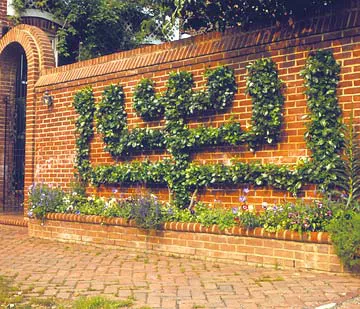How to Espalier Fruit Trees, Vines, and Other Greenery

Espalier is the term used to describe the process of training trees, shrubs, and woody vines against a flat surface, such as a wall. You can also train them to a freestanding fence or trellis.
To espalier, prune to create a main vertical stem, then train the side branches to achieve the desired shape. Depending on the plant, this can take a year or two to establish and requires regular care. Thereafter, an espalier requires only light pruning to hold its shape.
Instructions
Step 1: Plan your pattern. Espalier fruit trees in a pattern. Fruit trees are often grown horizontally (diagram A) to maximize the fruit set. Or, the branches can be turned up (B and C) to produce a more compact pattern. For quick coverage of long walls, consider planting several trees and training them into a Belgian fence pattern (D).
Step 2: Choose a location. Any solid wall will do as long as there is enough light for the plant you want and room to plant. You can also use a container, provided it is large enough to hold the plant when it is mature.
Step 3: Choose the plant. Most plants can be espaliered, but those with naturally spreading branches, such as apple, pear, quince, and camellia, work best. Look for a plant that already has a start on the branching pattern you want. Make sure the plant is suitable for the location.
Step 4: Prepare the support. Run wires between nails in the wall or posts in the ground to create three horizontal lines. Use heavy-gauge wire that can resist the pull of the branches as they try to grow toward the sun. Wire isn't necessary for vertical branches; they'll grow that way naturally.
Step 5: Plant the tree or shrub. Set the plant about a foot in front of the support structure. Position the plant so that at least two of the strongest branches run in the direction of the wires.
Step 6: Train the branches. Remove all but two shoots on each branch. Attach the remaining shoots to the wires with soft ties.
As the central trunk grows, keep removing side shoots. When the trunk reaches the next wire up, allow two side shoots to develop (remove the rest) and attach them to the wires.